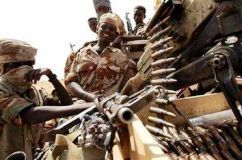Escalating tribal tensions fuel new Darfur attacks
July 12, 2006 (KHARTOUM) — Rape, killing and looting are increasing as tribal tensions escalate in Sudan’s troubled Darfur province, the United Nations’ top envoy to the country said on Wednesday, despite a peace deal he had helped broker.
 U.N. envoy Jan Pronk described an attack by a rebel faction led by Abdel Wahed Mohammed al-Nur, whose members mostly come from the Fur tribe, on a group of women refugees to illustrate his point.
U.N. envoy Jan Pronk described an attack by a rebel faction led by Abdel Wahed Mohammed al-Nur, whose members mostly come from the Fur tribe, on a group of women refugees to illustrate his point.
“They were tied to a tree, beaten, forced to eat donkey dung, raped in turn for three days by 30 men who had accused the women of espionage because they were married to Zaghawa men,” Pronk told reporters, referring to the Zaghawa tribe.
“That means civilians are being attacked and the tension becomes of a tribal character. That is especially what we wanted to stop with the peace agreement,” Pronk added.
Pronk said the account had not been verified, but that the victims should be believed. A recent U.N. report also cites rising tribal tensions in some refugee camps.
Representatives for Nur, who leads a splinter faction of the Sudan Liberation Army (SLA), could not immediately be reached for comment.
In May, the mainstream SLA faction led by Minni Arcua Minnawi signed a peace deal with the Khartoum government, but the agreement has been widely ignored. Nur’s rebel group and the smaller Justice and Equality Movement did not sign the deal.
Minnawi is from the minority Zaghawa tribe. A U.N. report on Sunday cited witnesses alleging that Minnawi troops had raped and killed women from the Fur tribe. Minnawi denies this.
The U.N. has said the rebel groups have begun to fight each other, with the Sudanese military apparently supporting Minnawi’s faction.
Both the Fur and the Zaghawa tribes are African, not Arab. Non-Arab rebels took up arms against the Khartoum government in early 2003 accusing it of neglect and monopolising power.
Khartoum responded by arming mostly Arab militias, known as the Janjaweed, who stand accused of a widespread campaign of looting, killing and burning in non-Arab villages.
Tens of thousands have died in the violence and 2.5 million people forced into camps.
Earlier on Wednesday, U.N. humanitarian relief coordinator Jan Egeland said it was “heartbreaking” that the SLA rebel groups had adopted the Janjaweed’s methods.
Sudan has rejected U.N. transition in Darfur likening it to a Western invasion that would attract jihadi militants and cause an Iraq-style quagmire.
But analysts say Khartoum objected to U.N. troops because it feared the soldiers would arrest any officials or militia leaders likely to be indicted for war crimes by the International Criminal Court.
(Reuters)
